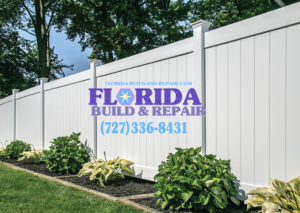DIY Wood Privacy Fence Installation in Westchase: Tips & Tricks
Here are some tips and tricks for a successful DIY wood privacy fence installation in Westchase:
1. Planning and Preparation:
- Check Local Regulations: Review Westchase’s zoning laws, HOA guidelines, and any height restrictions. Ensure you understand the requirements for fence placement, height, and materials.
- Obtain Permits: If necessary, obtain a building permit from local authorities.
- Notify Neighbors: Inform your neighbors about your plans to install a fence, especially if it’s along a shared property line.
- Call 811: Before digging, contact your local utility locator hotline to mark underground utilities.
- Layout and Marking: Use stakes and twine to mark the fence line, ensuring it’s level and taut. Measure and document gate sizes if you plan to include gates.
2. Tools and Materials:
- Tools: Gather tools like a post hole digger, shovel, level, tape measure, hammer, drill, circular saw, jigsaw (optional), pneumatic nailer, portable air compressor, speed square, wheelbarrow, ladder, work gloves, eye protection, and hearing protection.
- Materials: Purchase four-by-four pressure-treated posts, two-by-four pressure-treated lumber for rails, fence pickets (pressure-treated or cedar), concrete mix, gravel, exterior screws or nails, and a gate hardware kit if applicable.
3. Digging Holes and Setting Posts:
- Dig Post Holes: Dig holes at least 30 inches deep, or one-third the height of the fence, plus a few inches for gravel. Space posts 6-8 feet apart.
- Add Gravel: Pour 3-4 inches of gravel into each hole for drainage.
- Set Posts: Place posts in the holes, ensuring they are plumb and level. Fill holes with concrete, sloping it away from the post to prevent water pooling. Allow concrete to cure for at least 24 hours.
4. Installing Rails:
- Attach Rails: Secure bottom rails to posts at least six inches off the ground. Attach top rails in the same manner, alternating which post you attach to for stability.
5. Installing Pickets or Panels:
- Attach Pickets: Secure pickets to the rails using screws or nails. Ensure they are evenly spaced and level. For a shadowbox fence, alternate pickets on each side of the rails.
- Align Pickets: Use a string line or a 2×4 guide to keep the tops of the pickets at a uniform height.
6. Building and Installing Gates:
- Gate Hardware: Install gate hardware according to the kit’s instructions. Ensure gates are wide enough for passage and are level.
7. Finishing Touches:
- Stain or Paint: Apply a weatherproof finish, stain, or paint to protect the wood. Wait until pressure-treated wood has dried before applying any finish.
- Post Caps: If using post caps, tap them on with a rubber mallet.
8. Maintenance:
- Regular Inspections: Check for damage, loose connections, or rot. Address issues promptly.
- Sealing: Reapply a wood preservative around the base of the posts every 2-3 years to prevent rot.
9. DIY or Professional Installation:
- DIY: If you choose to install the fence yourself, follow these steps meticulously. Remember, wood fences require more labor than other materials.
- Professional: Consider hiring professionals like Westchase Fencing for expertise, especially if you’re unsure about any part of the process or if the project scope is too large.
Additional Tips:
- Use a 2×4 Guide: Set a 2×4 board on its face to use as a 1-1/2-inch guide along the bottom when installing pickets on a slope.
- Consider the Slope: Plan your fence layout to accommodate any slopes or uneven terrain, using stepped or racked fencing methods.
- Check for Bow: When installing rails, place the bow upward between posts to ensure a straight fence line.
By following these tips and tricks, you can successfully install a wood privacy fence in Westchase, enhancing your property’s privacy, security, and aesthetic appeal. Remember to prioritize quality materials, proper installation techniques, and regular maintenance to ensure your fence lasts for many years.

Hiring a Pinellas County Contractor for Privacy Fence Installation: What to Know
Finding the right contractor for privacy fence installation in Pinellas County requires careful consideration of local regulations, contractor qualifications, and material options. This comprehensive guide

Florida Fence Installation on a Budget: Affordable Options That Look Great
The search for attractive yet affordable fencing in Florida presents homeowners with several viable options that balance cost with aesthetic appeal. Florida’s unique climate and

How Much Does Westchase Wood Privacy Fence Installation Cost?
The cost of installing a wood privacy fence in Westchase can vary based on several factors including the type of wood, the height of the

DIY Wood Privacy Fence Installation in Westchase: Tips & Tricks
Here are some tips and tricks for a successful DIY wood privacy fence installation in Westchase: 1. Planning and Preparation: 2. Tools and Materials: 3.

Wood Privacy Fence Installation in Westchase: A Step-by-Step Guide
Here’s a step-by-step guide for installing a wood privacy fence in Westchase: 1. Planning and Preparation: 2. Gather Tools and Materials: 3. Digging Holes and

Step-by-Step Fence Installation in St. Petersburg: A DIY or Professional Job
Installing a fence in St. Petersburg can be a rewarding DIY project, but it also presents challenges that might make hiring a professional more appealing.

Step-by-Step Guide to Florida Privacy Fence Installation
Privacy fences in Florida require special considerations due to the state’s unique climate, local regulations, and environmental factors. This comprehensive guide walks you through the

St. Petersburg Fence Installation for Uneven Terrain: Tips and Tricks
When installing a fence on uneven terrain in St. Petersburg, there are several effective methods and considerations to keep in mind: Terrain Assessment Before beginning

Professional St. Petersburg Vinyl Privacy Fence Installation vs. DIY: Which One Should You Choose?
Here’s a detailed comparison to help you decide between professional installation and DIY for a vinyl privacy fence in St. Petersburg: Key Considerations Factor Professional


